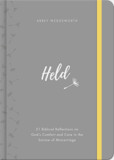
“You hem me in, behind and before, and lay your hand upon me.” -Psalm 139:5
The author of this psalm, King David, was a soldier, and he is employing military language here to describe the experience of being surrounded as if by an enemy, conjuring up the feeling of being trapped.
The language is uncomfortable because the experience is uncomfortable. We don’t like to feel limited and powerless.
Miscarriage, like many types of loss and suffering, brings us face to face with our limits. Perhaps you’ve experienced your physical limitations as you suffer weakness from blood loss or the woozy effects of anesthesia. Maybe it’s been presented in the pain of cramping as your uterus shrinks back to normal size.
Have your fluctuating hormones induced night sweats, mood swings, or shakes? Perhaps you’ve been confronted with your mental limits in the inability to process, pay attention to, or understand all that is happening. Maybe your emotional limits have been put before you as grief takes you by surprise like a rogue wave. You can’t seem to make yourself stop crying; or you can’t work up the courage to allow yourself to start.
Miscarriage is an incredibly human experience. Miscarriage tells us we are limited.

31 biblical reflections for women on God's comfort and care in the sorrow of miscarriage.
The psalmist, in one word, reveals the spiritual significance of these limits and helps us understand how we are to experience them: “You.”
He ascribes his limitations to God, crediting him with establishing and maintaining them. Just as God gives boundary lines to the ocean, telling it how far it may come (Job 38:11), and just as he holds the sun, moon, and stars in place (Psalm 8:3), so he sets limits on us by housing our souls within flesh.
Frustrated as we may feel by it, our humanity is nothing to be ashamed of. When God formed Adam and Eve, before sin entered the world, he called what he had made—namely their bodies—good.
When Jesus took on flesh, he showed us the beautiful fruit that can come from being wrapped up in skin: humility.
“When Jesus took on flesh, he showed us the beautiful fruit that can come from being wrapped up in skin: humility.”
Though he was in the form of God, [he] did not count equality with God a thing to be grasped, but emptied himself, by taking the form of a servant, being born in the likeness of men.
—Philippians 2:6-7
In the life he lived within the confines of human limitations, Jesus was hemmed in by hunger and thirst and bodily weakness. From that place, he demonstrated the beautiful sustaining power of living life in a posture of dependence on his limitless Father.
So often, rather than having the mind of Christ Jesus, as Paul encourages us to do in Philippians 2:5, we behave as if equality with God is in fact a thing to be grasped, by rejecting our own limitations.
We try to manipulate our circumstances; we deny our hungry bodies food; we power through when we need to rest; we continue to lift when we know something is too heavy. But this refusal to exist as we were designed to exist leaves us more exhausted and stressed, not less.
It is a kindness of God to allow us to experience our human limitations. They enable us to appreciate his limitlessness, to know him more, and to live as we were created to live: in full dependence on our Creator.
The humiliation we feel over our limitations can be transformed into beautiful gospel humility as we hear the call of our limitless God from the mouth of our incarnate Savior:
“Come to me, all who labor and are heavy laden, and I will give you rest.”
The One through whom all things were made, and in whom all things hold together, describes himself as humble and invites us to learn from his example as we benefit from his humble and gentle service (Matthew 11:28-29; Colossians 1:16-17).
In this way, the frustrating experience of being hemmed in actually is rather like the hemline of a garment, because in deciding our limits and allowing us to experience them—in bringing us to the place where we feel frayed—God keeps us from unraveling by leading us to himself.
This is the beauty of being besieged and beset by God as the psalmist describes.
“Our surrender gives way to his sufficiency. Resignation gives way to rest.”
God doesn’t bring us to the end of ourselves because he is a bully who wants us to feel small, but because he is our gracious Father, who wants us to be at peace. Convinced of his strength and sustaining power, we can stop fighting and resenting our own humanity, and boast with the apostle Paul (2 Corinthians 12:10): “When I am weak, then I am strong.”
This is an extract from Held: 31 Biblical Reflections on God's Comfort and Care in the Sorrow of Miscarriage by Abbey Wedgeworth. The 31 biblical reflections in this beautiful and comforting book remind grieving women that God sees them, knows them, loves them, and is actively caring for them.